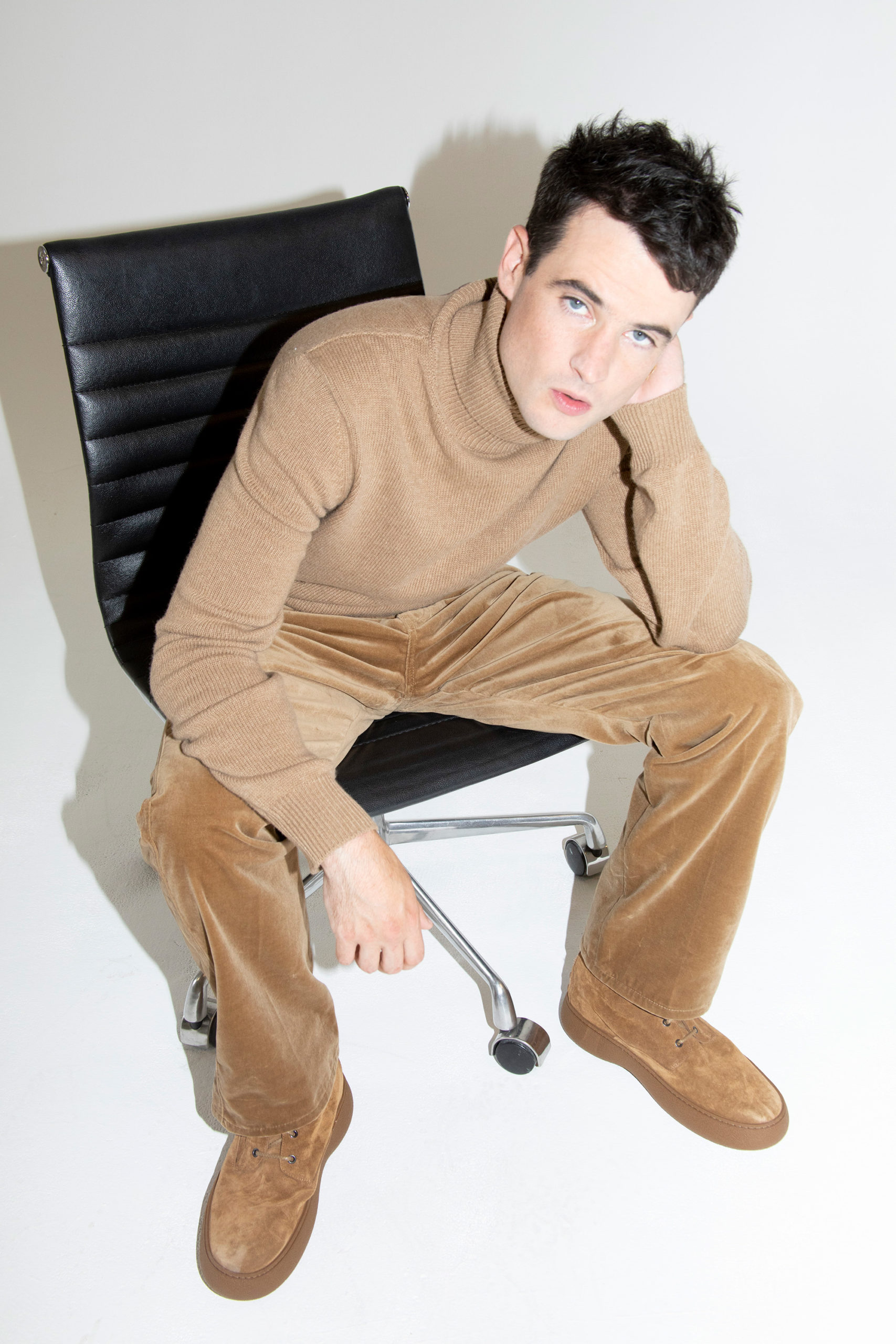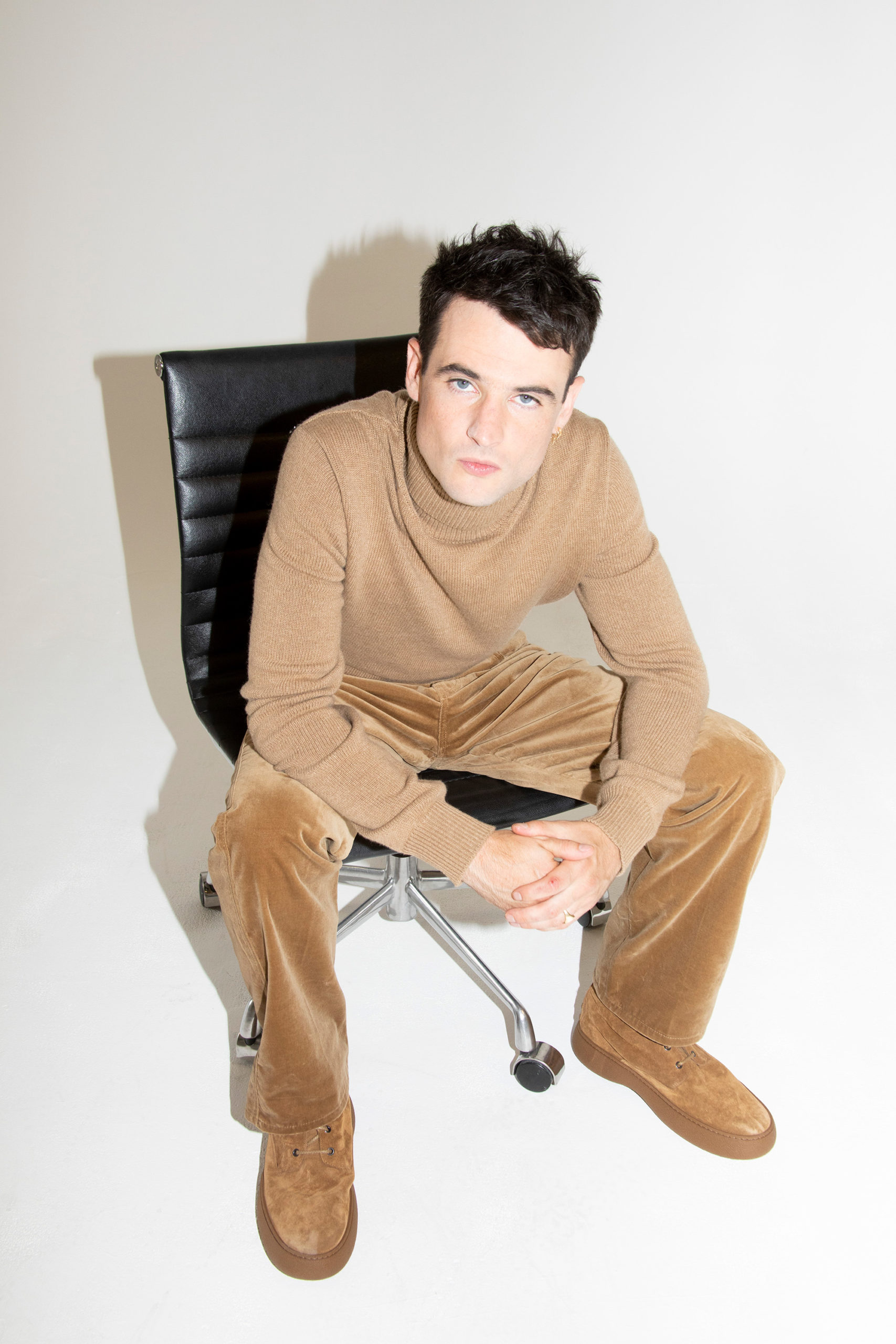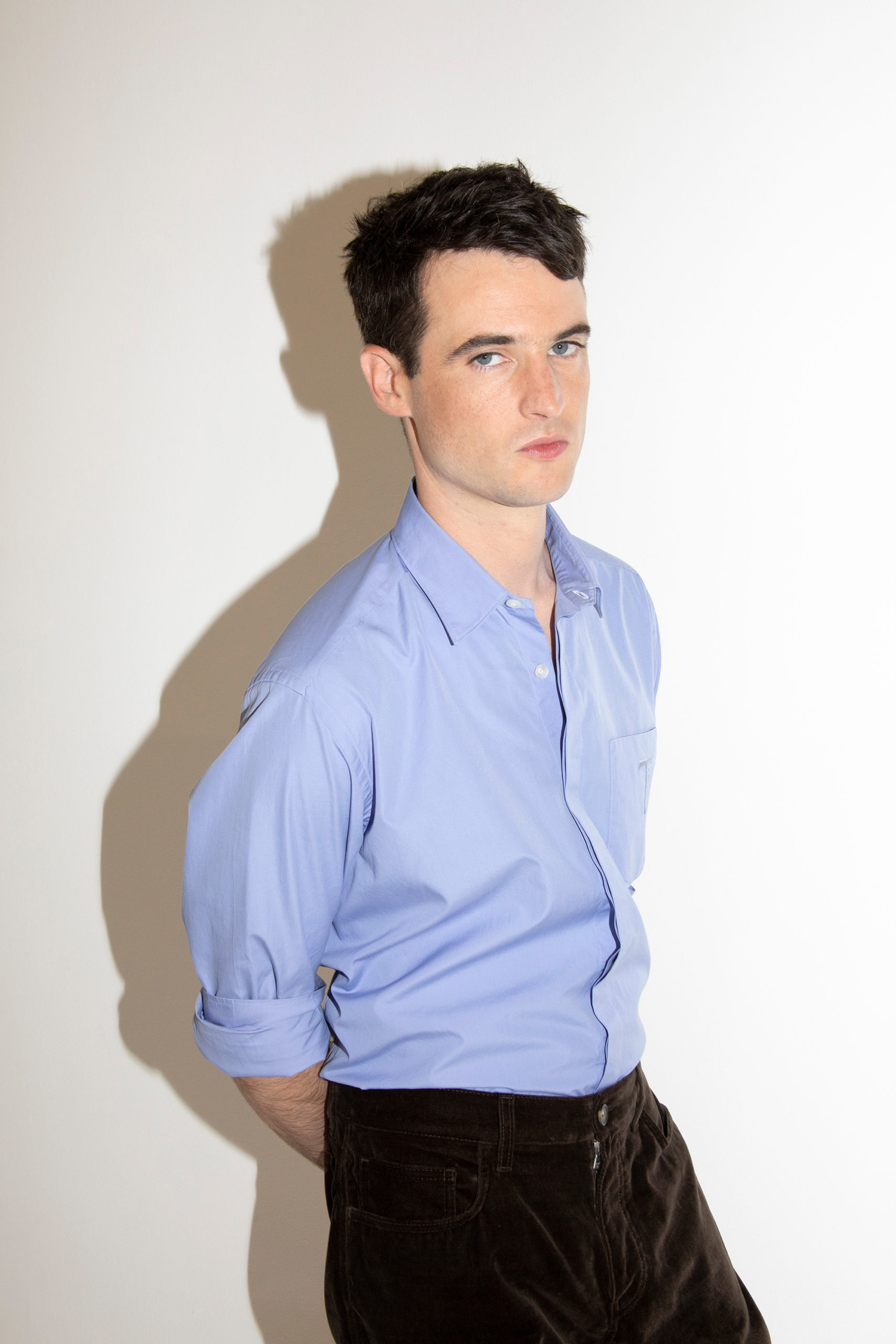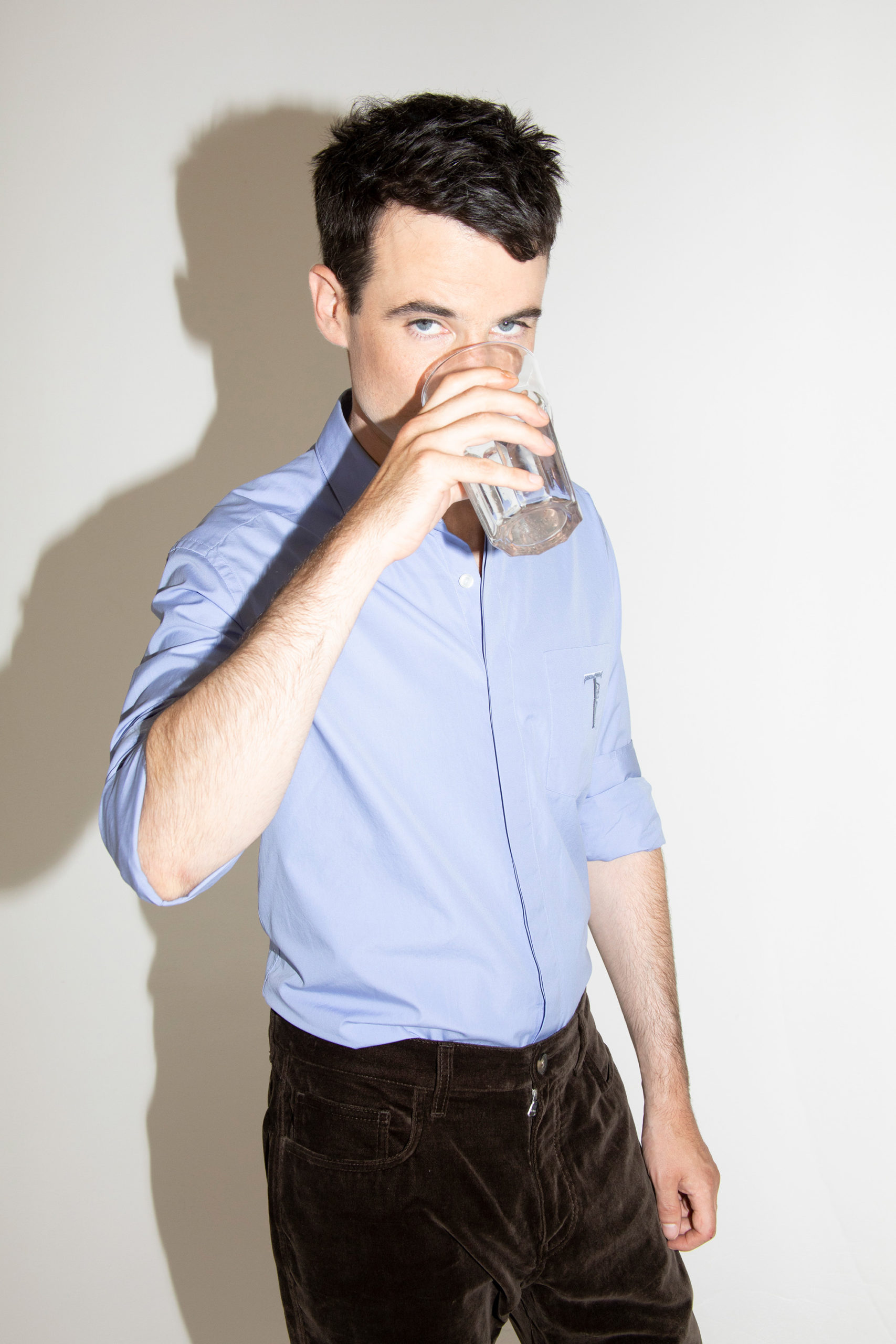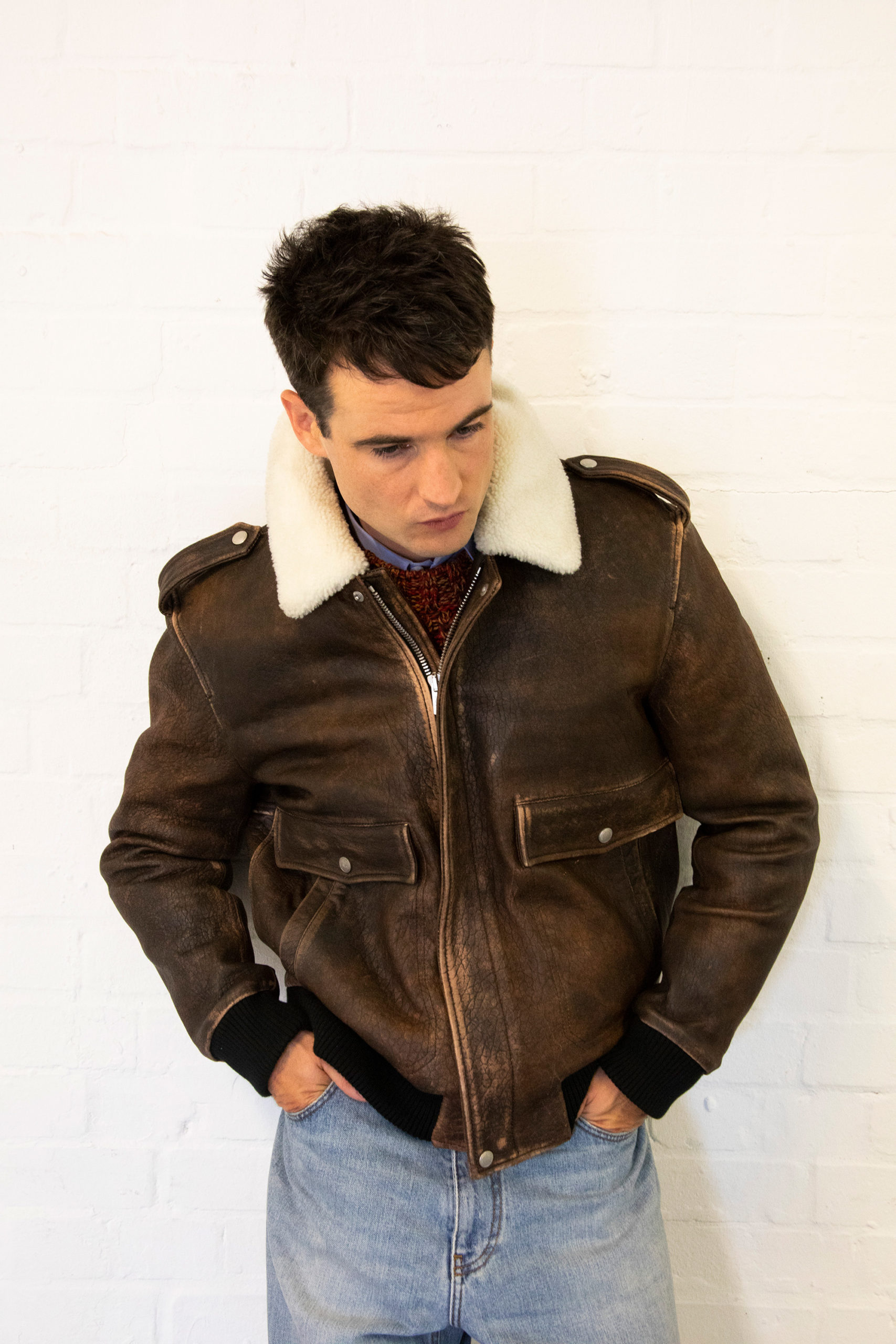DREAMBOAT
Tom Sturridge Tells Anna Wintour Why He’s Drawn to the Darkness
For Tom Sturridge, the fantasy becomes real in The Sandman, Netflix’s long-awaited adaptation of Neil Gaiman’s groundbreaking graphic novel. The London native has been acting since childhood, and at age 36 already has two Tony nominations under his belt. But playing Morpheus, the literal embodiment of dreams and a character that has fascinated Sturridge for years, meant putting it all on the line. How did he do it? His friend Anna Wintour wants answers.
———
TOM STURRIDGE: Morning!
ANNA WINTOUR: Hi, Tom. Are you in L.A.?
STURRIDGE: Yes.
WINTOUR: I’m sorry, it’s early. Do you want to get some coffee?
STURRIDGE: No, I feel very lovely.
WINTOUR: Great. So how’s the junket for The Sandman been going?
STURRIDGE: It’s good. It’s a strange thing when you do something for a comic book because people genuinely know what they’re talking about. They care about it a lot.
WINTOUR: How about, obsessed?
STURRIDGE: Exactly. It’s actually fascinating to be interrogated by people who really know what they’re talking about. Normally junkets are frightening and kind of lonely.
WINTOUR: Yeah. And then you go back to London?
STURRIDGE: I go back to London tonight, and there’s a premiere on Wednesday.
WINTOUR: What are you going to wear?
STURRIDGE: I’m wearing Saint Laurent. A black velvet suit.
WINTOUR: Excellent. So as you said, you’re playing this character that so many people feel so passionately about. I’m sure that was on your mind as you were preparing for The Sandman. You mentioned to me the other day that you read and reread it many, many times, but now you’re engaged in a conversation with all these outside people who have very deep feelings. What is that like?
STURRIDGE: Well, I was frightened when I embarked upon this because I was such a big fan and therefore understood exactly how the people who care about it as much as I do felt. When I read it, I made a film of it in my head, and I was so confident that everyone else who loves The Sandman had made that film as well. So the fear that I had was about doing justice to the dream films that have been made of it.
WINTOUR: So were you involved in the visualization at all?
STURRIDGE: Just for my character, Morpheus. The comic began in 1989, so I was trying to find a way to create a contemporary image of him. He looks quite strange in the comics. He’s very pale, and he has huge, crazy hair.
WINTOUR: [Laughs] Well, that’s right up your alley.
STURRIDGE: I know. And he has black eyes with stars in them. We did a number of camera tests where they painted my skin as white as a piece of paper and put black contact lenses in. I had huge, mad hair, and I looked exactly like the drawings in the comic. But Neil [Gaiman, The Sandman author] made a really important point, which was that whenever Morpheus walks in the real world, in London or in New York, you would never notice him. He must be able to slip into the fabric of the universe he’s in. When I walked around the studio like that, everyone thought I was completely insane.
WINTOUR: It was a bit too Halloween, maybe.
STURRIDGE: Highly Halloween. Neil finally said, “Tom, your hair is really messy. You look sick, you’re so pale. And if I stare into your eyes, I can see the cosmos. So it’s fine. We’re good.”
WINTOUR: But there was obviously some influence there, Tom. We talked about the Sex Pistols, and I saw a bit of Keith Richards, Pete Doherty. You did push it a little bit.
STURRIDGE: Absolutely. I looked at images of Sid Vicious, and one of the original inspirations for Neil was Robert Smith from The Cure. But when it came down to living it, I found it wasn’t particularly helpful thinking of other people.
WINTOUR: And what about the physical transformation? Because you told me you had lost an astronomical amount of weight.
STURRIDGE: I lost three stone.
WINTOUR: How did you do that?
STURRIDGE: The first thing is you—
WINTOUR: You starved yourself, but why did you feel that was necessary? Because you’re not exactly big to begin with.
STURRIDGE: I’ll tell you exactly why. Because in the opening of our story, my character is captured and imprisoned.
WINTOUR: They have you in a glass box for a century.
STURRIDGE: Yeah. And he’s nude, and doesn’t speak, so it was important to figure out a way to articulate to an audience that this creature was not human, and the only way I could do that was physically. There were very particular images from the comic that I wanted to recreate with my body. The way I think about it, because he’s lived for millennia and because his responsibility is the creation of dreams, he’s sort of metabolizing dreams inside of himself, which means he’s burnt off all his flesh and he’s just bone and sinew. So that’s what I went for.
WINTOUR: Yes. So, we talked about this last week, but I think Interview’s readers will want to know about your dreams as you were going through this. Or have you stopped dreaming?
STURRIDGE: No, no, no, I dream. I’m the kind of person that if I wake up and I have the possibility of sleeping a little bit more, I will intentionally sleep more, not to rest, but to dream again.
WINTOUR: Really?
STURRIDGE: I remember the day I got the job. When I went to sleep that night, the character came to me in my dreams. That was an incredibly overwhelming and emotional experience. I’ve since looked for him in my dreams to ask how to play the character, but I never met him again.
WINTOUR: Well, maybe one day. So Tom, when I look at your work, particularly your theater work, you are definitely drawn to troubled characters and tortured souls.
STURRIDGE: Yeah.
WINTOUR: I don’t think of you as a tortured soul or troubled character. You’re tons of fun. So, I wonder what you feel like you have to explore within yourself and on the stage. I’m thinking obviously about 1984, where you were so extraordinary, or Sea Wall/A Life, or even American Buffalo. These are not happy-go-lucky guys. Why do you keep going back to those roles?
STURRIDGE: The first thing I’m drawn to is a piece of writing, to an author, to a director. Weirdly, it’s rarely a character. I want to work with people or with texts that push me and make me learn things that I think I can’t do. Because if I think I can do it, then I can’t surprise myself. And if I can’t surprise myself, then I’m definitely not going to surprise an audience.
WINTOUR: Yeah. The fear factor.
STURRIDGE: Absolutely. Actors who are drawn to tortured souls risk leaning into cliché. But I think what I’m attracted to is being able to explore a spectrum of emotion. It’s easier to find comedy in something sad than it is to find darkness in something funny. I can be all kinds of people when the darkness is there. Also, the first character I ever played onstage was a boy who murders all of his schoolmates [in Punk Rock]. I do think there’s something to be said by, “You get stuck in a gorge that you start with.” People have always gone, “Oh, yeah. He’s the fucked-up guy.”
WINTOUR: [Laughs] You could say no.
STURRIDGE: I could. I don’t have a therapist, so you’ve got to interrogate that part of yourself somewhere, sometime.
WINTOUR: Right. Well, I hear you’re in love, Tom, so maybe there’ll be a few romantic comedies coming down the road.
STURRIDGE: [Laughs] We’ll see.
WINTOUR: So I loved you in American Buffalo, but I have to say I saw you twice, maybe three times in Sea Wall/A Life. That’s the performance that stays with me. I was talking to another actor this weekend and they were saying they just can’t wait to get onto the stage every single night. They just love hearing the audience and the rustling of the Playbills and they’re very present. I’m wondering, when you are waiting to go onstage, particularly in a role that’s so compelling and must be so difficult to do, what helps you create that performance every night?
STURRIDGE: What I remember about that play is that, at the beginning, I would walk out of the stage door on 44th Street, down to Times Square and around 45th Street to the front of the theater, and queue up with the audience.
WINTOUR: Really?
STURRIDGE: Yes, every night.
WINTOUR: And they didn’t recognize you?
STURRIDGE: No. It was weird. I did have quite a large picture of me relatively close by, but the way that the night would go would be based on how that queue felt.
WINTOUR: Really?
STURRIDGE: Yeah. Every time I would go in and—I don’t know if you remember, but I drank a beer at the beginning of the play—so I would go to the barman and order a beer.
WINTOUR: You’d have a real beer?
STURRIDGE: Well, that’s up for interpretation. And then I’d walk down the aisle and climb onto the stage and have a beer. And when I’d finished the beer and everyone sat down, we’d start the play. There’s a strange thing in theater where, as an actor, you have to live the lie, which is that nobody’s in the room.
WINTOUR: The third wall.
STURRIDGE: Exactly. And what was extraordinary about that is I didn’t have to live that lie. Acting is always a leap of imagination, and the smaller the leap you have to make, the easier it is to tell the truth. It was so glorious acknowledging everyone’s existence, a magical experience.
WINTOUR: So would you be interested in doing a play that involved the audience more?
STURRIDGE: Yeah, I think I’ve always been drawn to that. The first play I ever did was called Punk Rock.
WINTOUR: Right.
STURRIDGE: Sarah Frankcom, who directed it, had this amazing idea where we’d walk to the front of the stage and when we were in our most articulate moments, really speak to the audience. And then in 1984, towards the end of the play when I was being tortured, they turned on the lights.
WINTOUR: Yes, I remember.
STURRIDGE: It was their way of going, “This is real, you’re all in this room. Is this ethically the right decision to watch a boy have his tongue cut out? Do you want to be a part of this?” And people did decide to leave sometimes. That was amazing. Sea Wall/A Life is an extension of that.
WINTOUR: It’s interesting coming back to the theater from COVID and seeing, frankly, that it’s the classic, traditional shows that seem to be doing well and it’s the ones that are a little bit more socially conscious or of our times that are struggling. I feel like England does a better job with this than we do in the United States. The theater is more democratic, there are less expensive seats, et cetera. Do you feel that there will be a moment on Broadway where a group of actors, or theater people, might come together and create something for the people?
STURRIDGE: I think there’s definitely room for it. For example, Jake Gyllenhaal, not only did he star in Sea Wall/A Life with me, but he also produced it. We worked very hard to try and make those tickets affordable and to do it in a way that would also make money back for the producers. We were very proud that, in a nine-week run on Broadway, Jake made the money back for everyone who invested in it. So there is a way of doing it, it just requires creative thinking.
WINTOUR: Coming out of COVID is like waking up from a century. So much has changed and people’s values have changed, but Broad.way seems a little bit relentless in its wanting everything to be the same. So I guess my question to you is, for someone of your intelligence and interest in the theater, is there another role you could see yourself taking, whether it’s producing or writing or directing?
STURRIDGE: I think about making theater all the time in all its forms. One of the most creative spaces at the moment is in producing and finding ways to make it affordable. Some of the most thrilling, dangerous, complicated plays are alive in the subsidized theater in England and off-Broadway. I want to bring those to audiences who are used to seeing these great plays that we know and love, but have seen them a thousand times.
WINTOUR: So Tom, Broadway doesn’t seem to have changed after the pandemic, but how did it change your values?
STURRIDGE: I’m someone who needs the engine of work to feel alive. We made The Sandman throughout the pandemic so I experienced it in an unusual way. For me it was about bearing witness to the extraordinary men and women who made The Sandman, and how they found a new way of working, of making something on that scale, while keeping everyone and their families safe and healthy. Watching that problem solving was incredibly moving.
WINTOUR: Okay. Tom, unless there’s something else you want to cover, I have one last question.
STURRIDGE: Okay.
WINTOUR: If you woke up from being imprisoned in a glass box a hundred years from now, what changes would you most like to see in the world?
STURRIDGE: You know what I think of when you ask that question? I think of Marlowe, my daughter.
WINTOUR: Yes.
STURRIDGE: I think of how she is so much wiser than I am, and how I wouldn’t want to prescribe changes for the world, for her world, in a hundred years. The world is not as I would wish it to be. I am a sentient adult, and have the responsibility to inflict change on it. I am excited to see how much better she will do with that than I am.
WINTOUR: She will run the world.
STURRIDGE: [Laughs] We’ll see.
———
Grooming: Julia Carta
Fashion Assistant: Caio Reis

